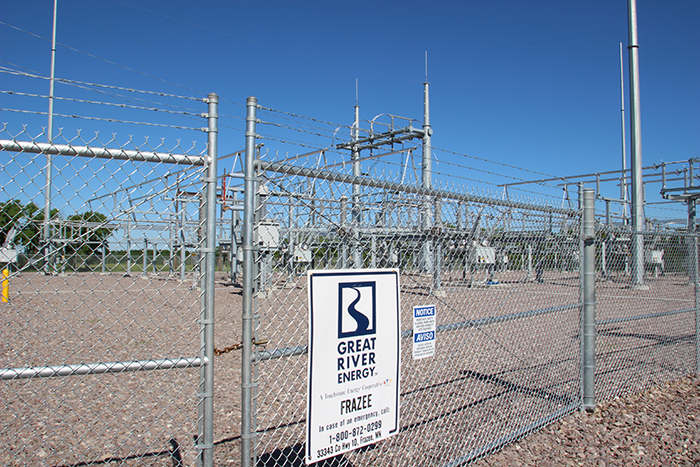Energy companies preparing for interruptions
News | Published on June 21, 2022 at 2:54pm EDT | Author: Chad Koenen
0
By Robert Williams
Editor
With potential rolling blackouts possible this summer, energy providers across the area are warning energy users about summer energy demand.
Lake Region Electric Cooperative (LREC) is taking a proactive approach by putting measures in place to ensure the safety and reliability of the electric grid with much warmer seasonal temperatures forecasted.
“Last week, the North American Electric Reliability Corporation warned that several parts of the country are at risk of energy shortfalls,” said Tim Thompson, LREC CEO. “Lake Region is working with Great River Energy, our energy provider, to ensure we are taking the necessary actions to protect the larger electric grid during these upcoming days of extreme temperatures throughout the central United States.”
In recent years, Texas and California have reported blackouts due to a lacking energy supply in multiple seasons. In 2021, more than million Texas businesses and homes were left without power during three winter storms in February. Estimates ranged up to 700 deaths were caused by the inadequate energy.
The North American Electric Reliability Corporation (NERC) is the United States’ authority on electric reliability. NERC’s 2022 Summer Reliability Assessment mirrored an announcement made by the Midcontinent Independent System Operator (MISO).
MISO manages the power grid in Minnesota and for 42 million people in the United States and Manitoba, Canada.
MISO projects the Midwest will have sufficient energy for the summer, however, they are taking additional measures to ensure reliable service is maintained during periods of peak demand or energy consumption.
Northern Minnesota is seeing the first heatwave of the summer this week with the first reported temperatures in the 90’s and highs in the mid to upper 80’s the next 10 days.
“In NERC’s released 2022 Summer Reliability Assessment, they have indicated the north and central areas of the MISO region are in a “high risk” category due to generator retirements and increased demand.
Those retirements center on the power grid’s continuing transition from fossil-fuel power to renewable energy. MISO estimates that about 33 gigawatts of coal-power capacity will be retired by 2041. Replacing that lost power with renewable energy cannot be guaranteed due to the lack of constant power generated by renewable energy, mainly solar and wind.
Extreme weather, either cold or hot, will exacerbate the problem.
“This can leave the market short on generation capacity when most of the MISO market experiences extreme weather, meaning, utilities will deploy their demand response programs or preform voluntary load reductions,” Thompson said.
In response to these energy concerns, LREC is prepared to enact current demand response (load control/off-peak) programs. There are currently 14,000 LREC members using one or more of our 28 demand response programs. Combining LREC’s demand response programs with other GRE cooperatives across Minnesota and parts of Wisconsin, there are a total of 200,000 services participating in demand response. This can include cycled air conditioning or controlled water heaters, irrigators, commercial loads with a standby generator, etc. Because of these robust programs, GRE can control 15% of its peak day load, or the equivalent of reducing electricity demand by more than 200,000 homes on a normal summer day, making a huge impact.
“We are able to be very proactive in anticipation of extreme weather events and work closely with our members to ensure they are properly prepared,” said Josh Hebert, Load Management Specialist at Great River Energy. “We depend on the flexibility of our programs, and the membership, to avoid paying higher market costs during times when demand for electricity is high. These programs also help avoid transmission and substation equipment from reaching thermal limits during extreme heat.”
While GRE has sufficient generation resources for their member cooperatives like LREC, the MISO market is projected to be short on capacity during its summer peak. In the event of a grid emergency, MISO calls on additional power supply resources, imports of energy from other regions and preforms voluntary load reductions to manage the electric system.
Temporary controlled manual load sheds, also known as rolling blackouts, are used as a last resort to keep the whole grid in balance. If there are temporary controlled load sheds, LREC members may experience a one-hour power outage at the substation level. LREC will communicate with our members through these events via www.lrec.coop, SmartHub, and social media platforms to ensure members are informed of the current situation.
Area customers could face hour-on, hour-off controlled blackouts after the warm weekend.
In hopes of avoiding this scenario, LREC has assured there is enough power generation for all members. GRE has carefully constructed a portfolio of power supply resources that provide low-cost renewable energy, along with a powerful fleet of dispatchable resources that allow it to generate or receive additional energy when needed.
These include hydropower resources, power supply contracts with other energy producers, as well as natural gas peaking plants, most with fuel oil backups in the event of a natural gas supply issue, that can start in a matter of minutes. All state administrative, legislative and MISO resource adequacy requirements and obligations have been, and will continue to be, met by GRE.
Residents and businesses can assist with lowering the risks associated with extreme weather conditions, such as using ceiling fans to make rooms feel a few degrees cooler instead of cranking up the air conditioner, delaying heat producing activities like running the dishwasher or doing the laundry until the evening hours and keeping blinds and curtains closed during the day—especially for east and west facing windows.

